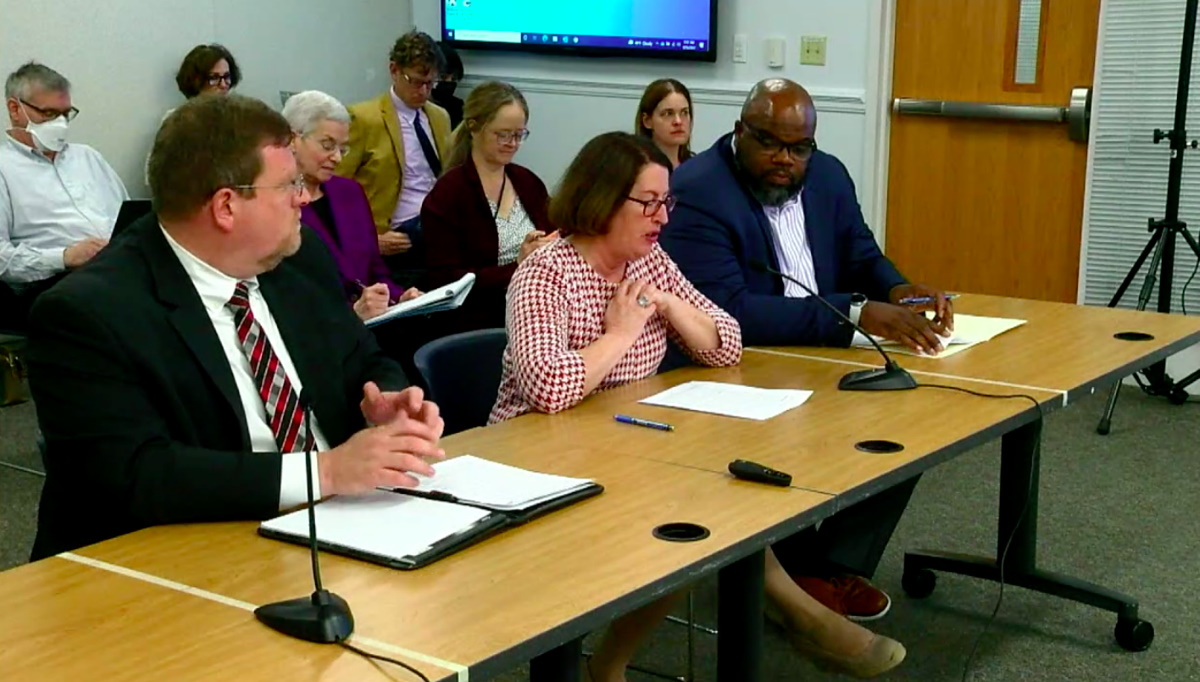latest
Massachusetts superintendents: COVID upheaval continuing in schools

By Katie Lannan
APRIL 26, 2022…..Though Massachusetts is now past the “apex of fear” with COVID-19, challenges like mental and emotional strain on students and staff persist in schools, superintendents said Tuesday.
“I’ll say it bluntly, that this year has been brutal for just about everyone in the field of education, and has been far worse than the year before,” Billerica Superintendent Tim Piwowar told the Board of Elementary and Secondary Education.
“Now don’t get me wrong, the 2021 school year was incredibly hard,” he said. “We had to build new educational systems on the fly in the form of hybrid schedules and fully remote options, we had to change the layouts of our schools to accommodate physical distancing, perform the public health functions of testing and contact tracing, and set up food distribution sites for our families, but throughout all of this there was a sense of purpose and meaning to the work, and a belief that if we rose to the challenge of meeting those sacrifices, we would see a return to normalcy. That is why this year has been so tough.”
Piwowar joined fellow superintendents Dianne Kelly of Revere and Patrick Tutwiler of Lynn in briefing the board, to offer what Elementary and Secondary Education Commissioner Jeff Riley described as a ground-level view of what’s happening in schools as they manage through this point of the pandemic.
Piwowar said an initial optimism that this school year would be a normal one “was replaced by fear and anger” over the summer as COVID-19 case counts again rose and some restrictions returned. Those negative emotions, he said, permeate various aspects of school systems, exacerbating students’ social-emotional needs and placing intense demands on staff who at times face personal attacks in the public realm over COVID rules.
The superintendents outlined challenges around mental health, staff recruitment and workforce diversity, and requested the board’s help in rebuilding an atmosphere of hope and optimism.
They also asked that the board consider regulatory changes that would allow schools to spend more time addressing student and staff needs and less time on compliance measures, partner with districts to implement a racial equity, diversity and inclusion strategy to support students, and extend licensure flexibilities to help mitigate staffing issues.
“I do feel like we have crested the apex of fear and worry and uncertainty that the pandemic brought to us,” Kelly said. “We’ve not beaten COVID by any stretch, so much as we have learned to live better with it, and that’s still great progress. In its wake, COVID and other societal events have changed who we are as individuals, as communities, as organizations and as systems.”
She said mental health among both students and educators remains “a major concern.” Students had to deal with the isolation and disruption of remote learning, and are now adjusting to the behavioral expectations of being back in school — for instance, Kelly said, many have gotten used to the ability to get up and use the bathroom or make a sandwich whenever they wanted to while learning from home.
Tutwiler, who said this has been “by far the most challenging year I have experienced in my career as an educator,” said that Lynn this year has seen more instances of extreme anxiety, depression and dysregulation among students than other years.
Coupled with stunted development around social skills and behavioral norms, that means the district’s clinical team has been stretched beyond its capacity and “has struggled to work beyond triage,” he said.
On the staffing front, Tutwiler said that when he tried to hire last spring, “few resumes trickled in,” with some positions netting zero. As the fall start of the school year approached, he said, retirements and resignations “happened at a clip we’ve never seen before,” particularly in programs serving high-needs students.
He said that while typically districts lean on their existing staff to cover gaps, the greater level of behavioral and personal challenges among students makes the additional responsibility “almost untenable.” He said he worries about staff deciding this year was too much and moving on to other roles.
Kelly said recruitment difficulty is “not a district-level problem” but pervasive throughout education. She said the “vitriol endured throughout COVID and the failure to understand just how strained the systems have been” are both driving people away from school jobs and making recruitment harder.
Kelly said the state should “take steps now to ensure there are license paths and compensation packages that bring people into the field of K-12 education.”





You must be logged in to post a comment Login